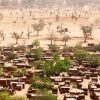News headlines in September 2017, page 6
Communities Can be Role Models for Sustainable Development
- Inter Press Service

UNITED NATIONS, Sep 15 (IPS) - The United Nations, governments, civil society, business, thought leaders and media will gather in New York on September 17 to celebrate the winners of the Equator Prize 2017. The 15 prize winning communities successfully advance innovative solutions for poverty, environment, and climate challenges.
Caribbean Picks Up the Pieces After Monster Storm
- Inter Press Service

ROAD TOWN, British Virgin Islands, Sep 15 (IPS) - When Hurricane Irma ripped through the British Virgins Islands on Sept. 6, claiming seven lives, injuring an unknown number of people and destroying built infrastructure as well as significantly damaging the natural environment, the ferocity of the storm shocked many of the islands' residents, including 72-year-old Egbert Smith, who has lived through plenty of severe storms.
Why Aung San Suu Kyi Chooses Silence
- Inter Press Service

UNITED NATIONS, Sep 15 (IPS) - On 23rd August, just days before thousands of Rohingyas began fleeing their homes from Rakhine State, Aung San Suu Kyi's recently appointed Rakhine Advisory Commission, established in 2016, submitted its final report. The engaging of an independent Commission, tasked with recommending newer ways of improving the lives of Rohingya Muslims, Myanmar's most deeply persecuted minority group, carried some weight of diplomacy.
At Key Finance Meet, Mongolia Seeks Path to a Greener Economy
- Inter Press Service

ULAANBAATAR, Sep 14 (IPS) - Rapid growth of a coal-fired economy often leads to environmental degradation, and Mongolia is a case in point.
Secretary-General Talks Myanmar, Trump Ahead of General Assembly
- Inter Press Service

UNITED NATIONS, Sep 14 (IPS) - In an environment full of major threats, countries must work together towards peace and stability, the Secretary-General said ahead of the General Assembly.
Civilians ‘Direct Targets’ as Conflict Spreads in Central African Republic
- Inter Press Service

UNITED NATIONS, Sep 14 (IPS) - Rape, torture, pillage, murder and forced displacement by the Union for Peace in Central Africa (UPC) rebel forces are the new horrifying realities faced by communities in Basse-Kotto, Central African Republic, according to the prominent London-based human rights group Amnesty International.
Dear Nobel Laureate, 19 September is 144 hours too late
- Inter Press Service

DHAKA, Sep 13 (IPS) -
Dear Nobel Laureate Aung San Suu Kyi,We learned today that you will address the Rohingya issue via television in Myanmar on 19 September - over 144 hours from now.
Fisheries in Africa, the Caribbean and Pacific – Immense Opportunities, Critical Challenges
- Inter Press Service

BRUXELLES, Sep 13 (IPS) - Fish is big business. The latest figures show that more than 165 million tonnes of fish are either captured or harvested in a year, with each person consuming more than 20kg of fish annually, according to the world average. Roughly US$ 140 billion worth of fish is traded globally per annum, with millions of people relying on jobs in fishing and fish-farming, not to mention the seafood industry which involves processing, transport, retail and restaurants.
Myanmar RohingyaFace “Textbook Example of Ethnic Cleansing”
- Inter Press Service

UNITED NATIONS, Sep 13 (IPS) - As hundreds of thousands of Rohingya Muslims flee violence in Myanmar's Rakhine State, thousands that remain in the country face mass atrocities at a scale never seen before.
Alert: Nature, on the Verge of Bankruptcy
- Inter Press Service

ROME, Sep 12 (IPS) - Pressures on global land resources are now greater than ever, as a rapidly increasing population coupled with rising levels of consumption is placing ever-larger demands on the world's land-based natural capital, warns a new United Nations report.
 Global Issues
Global Issues
